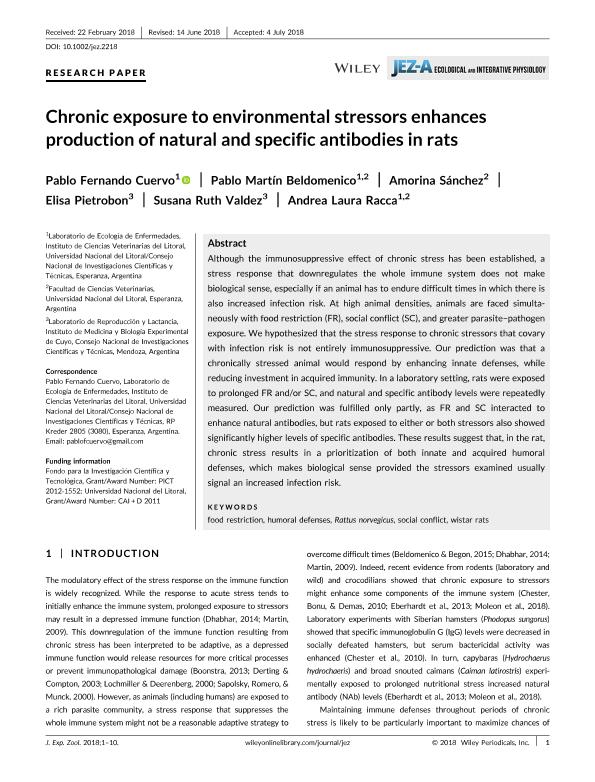Artículo
Chronic exposure to environmental stressors enhances production of natural and specific antibodies in rats
Cuervo Bustamante, Pablo Fernando ; Beldomenico, Pablo Martín
; Beldomenico, Pablo Martín ; Sanchez, Amorina; Pietrobon, Elisa Olivia
; Sanchez, Amorina; Pietrobon, Elisa Olivia ; Valdez, Susana Ruth
; Valdez, Susana Ruth ; Racca, Andrea Laura
; Racca, Andrea Laura
 ; Beldomenico, Pablo Martín
; Beldomenico, Pablo Martín ; Sanchez, Amorina; Pietrobon, Elisa Olivia
; Sanchez, Amorina; Pietrobon, Elisa Olivia ; Valdez, Susana Ruth
; Valdez, Susana Ruth ; Racca, Andrea Laura
; Racca, Andrea Laura
Fecha de publicación:
07/2018
Editorial:
Wiley-liss, Div John Wiley & Sons Inc
Revista:
Journal of Experimental Zoology Part A: Ecological Genetics and Physiology
ISSN:
1932-5223
Idioma:
Inglés
Tipo de recurso:
Artículo publicado
Clasificación temática:
Resumen
Although the immunosuppressive effect of chronic stress has been established, a stress response that downregulates the whole immune system does not make biological sense, especially if an animal has to endure difficult times in which there is also increased infection risk. At high animal densities, animals are faced simultaneously with food restriction (FR), social conflict (SC), and greater parasite–pathogen exposure. We hypothesized that the stress response to chronic stressors that covary with infection risk is not entirely immunosuppressive. Our prediction was that a chronically stressed animal would respond by enhancing innate defenses, while reducing investment in acquired immunity. In a laboratory setting, rats were exposed to prolonged FR and/or SC, and natural and specific antibody levels were repeatedly measured. Our prediction was fulfilled only partly, as FR and SC interacted to enhance natural antibodies, but rats exposed to either or both stressors also showed significantly higher levels of specific antibodies. These results suggest that, in the rat, chronic stress results in a prioritization of both innate and acquired humoral defenses, which makes biological sense provided the stressors examined usually signal an increased infection risk.
Archivos asociados
Licencia
Identificadores
Colecciones
Articulos(ICIVET-LITORAL)
Articulos de INST. DE CIENCIAS VETERINARIAS DEL LITORAL
Articulos de INST. DE CIENCIAS VETERINARIAS DEL LITORAL
Articulos(IMBECU)
Articulos de INST. DE MEDICINA Y BIO. EXP. DE CUYO
Articulos de INST. DE MEDICINA Y BIO. EXP. DE CUYO
Citación
Cuervo Bustamante, Pablo Fernando; Beldomenico, Pablo Martín; Sanchez, Amorina; Pietrobon, Elisa Olivia; Valdez, Susana Ruth; et al.; Chronic exposure to environmental stressors enhances production of natural and specific antibodies in rats; Wiley-liss, Div John Wiley & Sons Inc; Journal of Experimental Zoology Part A: Ecological Genetics and Physiology; 329; 10; 7-2018; 536-546
Compartir
Altmétricas



